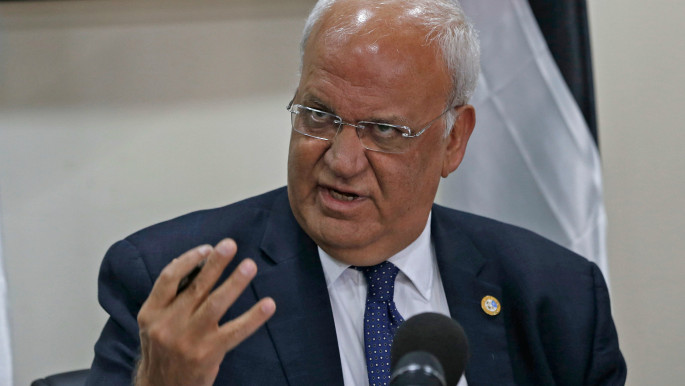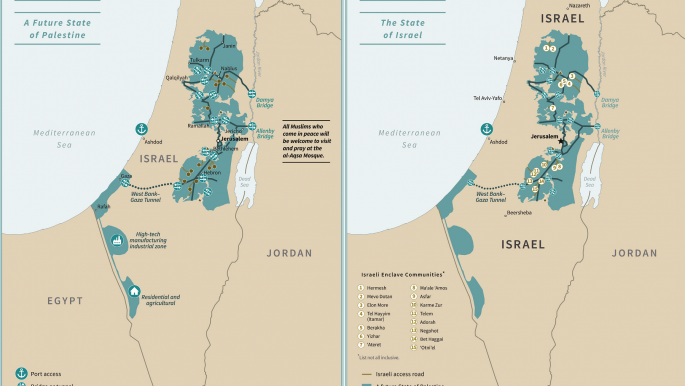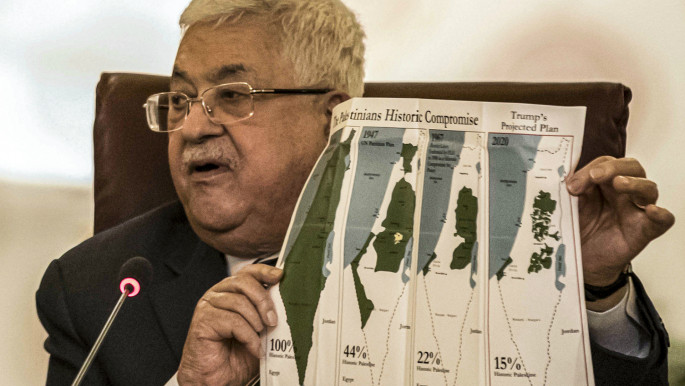Can the defunct Middle East Quartet keep Palestinian hopes alive?
The Middle East Quartet barely gets talked about these days.
Back in the late 2000s, it was led by Britain's statesmanlike ex-prime minister Tony Blair and brought together the powerhouses of the United States, the European Union, the United Nations and Russia with genuine hopes of cutting a peace deal between Israelis and Palestinians.
And while the Quartet has largely drifted into irrelevance in recent years, it was what Palestinian President Mahmoud Abbas – under mounting pressure from the US and Israel – hitched his wagon to at the UN Security Council on Tuesday.
The long-awaited US peace plan that President Donald Trump announced last month was little more than a wish list for Israeli settlers that offered Palestinians only "inland islands" that looked more like "Swiss cheese" than a country, Abbas told the council.
Read also: 'Deal of the Century': Palestinians feel letdown but can they resist American and Israeli dictation?
Now, world powers must look beyond Washington, which has abandoned its role as the lone, honest broker on Middle East peace, and instead turn to the Quartet or another "international mechanism" to seize the baton, he added.
"Any other country can join the Quartet... to be honest, the US alone cannot be the sole mediator," Abbas told diplomats from the US and Israel among many other countries in the chamber.
 |
|
| Read also: 'Wake up Israel, wake up America': Erekat leads Palestinian pushback against US plan |
"Among the Quartet, you are more than welcome. However, as the sole mediator, we will not accept. We have tried this now and honestly we cannot accept it again."
Abbas' chief negotiator Saeb Erekat explained further how the Palestinians could navigate between Israel's hawkish Prime Minister Benjamin Netanyahu and a Trump administration deal that falls far short of their demands.
In an article with Israeli newspaper Haaretz on Tuesday, Erekat outlined plans for an "umbrella group of a number of peace-loving countries to facilitate a meaningful peace process" based on past UN resolutions, not the new US proposal.
"Palestine is offering the world a serious proposal to achieve a just and lasting peace," wrote Erekat. "We are calling upon the international community to make sure that a rules-based world order, and third party responsibility, is the only way forward for everyone."
 |
Palestine is offering the world a serious proposal to achieve a just and lasting peace |  |
On January 28, President Trump released a long-awaited peace plan that envisions a disjointed, demilitarised Palestinian state, subject to Israeli control over its security, with tracts of desert in return for arable land on which Israeli settlers now live.
Read also: The 5 most bizarre proposals in Trump's bizarre 'Deal of the Century deal
The Palestinians seek all of the West Bank and East Jerusalem – areas captured by Israel in a 1967 war – for an independent state and the removal of many of the estimated 700,000 Israeli settlers who built homes on those areas.
But under the terms of the 180-page plan hatched by Trump's son-in-law and adviser Jared Kushner these past three years, all Israeli settlers would remain in place, and Israel would retain sovereignty over these settlements as well as the strategic Jordan Valley.
 |
|
| [Map source: White House 'Peace to Prosperity' document] |
The Palestinian pushback has involved garnering statements against the deal from the Arab League and the Organization of Islamic Cooperation and culminating in this week's Security Council face-off.
Tuesday's meeting was not the first time the Palestinians had suggested the US is no longer suited to cutting a deal with the Israelis – but it featured their most serious proposal on charting a different course for talks.
The Palestinians appeared to have some support in the chamber.
Vasily Nebenzya, the UN ambassador for Russia, which is a member of the Quartet, in part backed Abbas, telling the council of the "need to revitalise the efforts of the Quartet of international mediators".
Speaking with reporters on behalf of the European Union, Belgium's Foreign Minister Philippe Goffin, said the bloc still wanted to see the creation of a "contiguous" Palestinian state on land seized by Israel in the 1967 war.
Trump's plan "departs from these internationally agreed parameters," added Goffin.
 |
Tuesday's meeting was not the first time the Palestinians had suggested the US is no longer suited to cutting a deal with the Israelis – but it featured their most serious proposal on charting a different course for talks |  |
Still, the Palestinians struggled to muster enough support in the 15-nation chamber to pass a draft resolution condemning Israeli settlement building, even as Israel is reportedly devising maps with the US on how much West Bank to annex.
 |
|
| Read also: 'Deal of the Century': US and Israel circle wagons as Abbas heads to NYC |
After lengthy negotiations and concerns from the US and other council members, the Palestinians reportedly decided against putting the draft document up for a vote, with Erekat tweeting on Monday that negotiations were ongoing.
In the council, US and Israeli diplomats warned Abbas against their approach. Washington's envoy Kelly Craft said the Palestinians should "roll up their sleeves, and seize this chance to sit down with the leaders of Israel to begin a new conversation".
Speaking with reporters outside, Israel's UN ambassador Danny Danon said the Palestinians were more interested in rhetoric in Manhattan than the hard work of peace talks with Israelis.
"If President Abbas was serious about negotiating, he wouldn't be here in New York, he would be in Jerusalem," said Danon.
Answering a question from The New Arab, UN spokesman Stephane Dujarric said it was not immediately clear whether the Quartet, which is made up of "four entities", could be expanded in the manner Abbas suggested.
"That would be a discussion that would have to be had at the Quartet level," Dujarric said.
 |
If the single mediator principal won't work anymore, and if they want the conflict to end on a '67 borders two-state solution paradigm, then the clock is ticking and they must look for alternative mechanisms immediately that exist, including alternative institutions |  |
Still, according to John Lyndon, the Paris-based executive director of the Alliance for Middle East Peace, a campaign group, Abbas played a weak hand as best he could by turning back to the international community.
"Abbas is going back to first principles," Lyndon told The New Arab.
"If the single mediator principal won't work anymore, and if they want the conflict to end on a '67 borders two-state solution paradigm, then the clock is ticking and they must look for alternative mechanisms immediately that exist, including alternative institutions."
Still, Lyndon acknowledged that a Quartet intervention was unlikely to turn the tide in their favour.
"We'll continue to get the same statements," added Lyndon.
"Many diplomats are minded to run the clock down until November and cross their fingers that after the US presidential election there will be a different president and perhaps a different policy."
 |
|
| Abbas is greeted by other diplomats after speaking at the United Nations (UN) Security Council in New York on February 11, 2020 [Getty] |
Diana Buttu, who negotiated for the Palestinians in the 2000s, warned that Abbas had blundered as the veto-wielding US remained too powerful a player in the Quartet and the UN systems to easily bypass.
"It's no longer a question of what role the US or the UN should play, but a question of accountability," Buttu told The New Arab.
"Abbas should push for accountability and sanctions against Israel, starting with those countries that are willing to level sanctions or hold Israel accountable. Doing it any other way will continue this lopsided function."
James Reinl is a journalist, editor and current affairs analyst. He has reported from more than 30 countries and won awards for covering wars in Sri Lanka, Congo and Somalia, Haiti's earthquake and human rights abuses in Iran.
Follow him on Twitter: @jamesreinl



